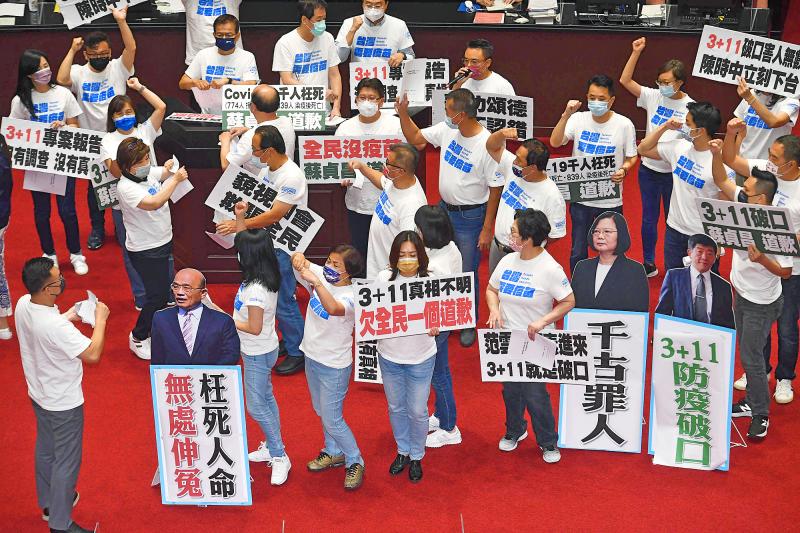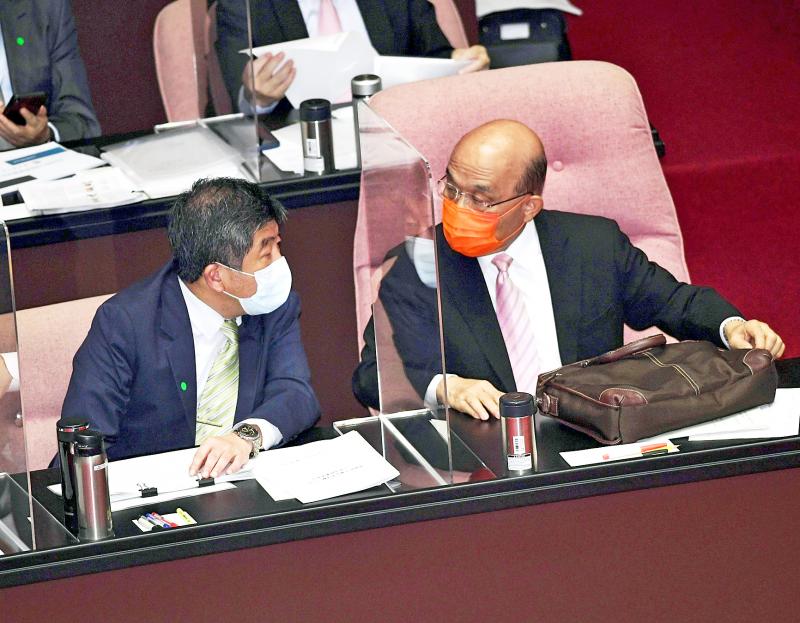A government policy for pilots and flight crew was procedurally sound and carried out with the intent to reinforce COVID-19 pandemic policies, while helping to prevent stress for flight personnel, the Executive Yuan said in a report yesterday.
The policy, dubbed “3+11,” which called for three days of isolation and 11 days of self-health management for pilots and flight crew, has been blamed for a cluster infection in April.
The Legislative Yuan called for the report on the process that led to the policy to supplement its review of a third increase of funding under the Special Act for Prevention, Relief and Revitalization Measures for Severe Pneumonia With Novel Pathogens (嚴重特殊傳染性肺炎防治及紓困振興特別條例).

Photo: CNA
The policy mandated that staff on overseas flights should have no contact with people outside of the airplane, isolate for meals and rest time while in the air and be subject to tracking by the Digital Fence System, the report said.
The disease prevention measures were far stricter than elsewhere and applied to all flight personnel, while whole flights in other countries have been exempted from quarantine requirements, the report said.
While there was no formal meeting or minutes showing the policy being made, promulgation of the rules was nonetheless legitimate, given the power granted to the head of the Central Epidemic Command Center (CECC), the report said.

Photo: CNA
Careful assessment was made of the capabilities of airlines to implement the rules and there was clear communication with the firms, it said.
Premier Su Tseng-chang (蘇貞昌) was to present the report and answer questions on the opening day of the new legislative session yesterday.
However, Chinese Nationalist Party (KMT) lawmakers blocked Su from taking the podium.
There was no sign that the report was a proper review, instead it was thinly veiled praise for the government, opposition lawmakers said.
As the ruckus began, Democratic Progressive Party (DPP) lawmakers rushed to form a human wall around Su, while KMT lawmakers shouted that the premier should step down.
KMT caucus secretary-general Jessica Chen (陳玉珍) and caucus whip Alex Fai (費鴻泰) tore up copies of the report and tossed shreds of paper toward Su.
“We do not accept the validity of this report and demand that a new investigation be conducted,” Fai said.
KMT lawmakers called on Su and Minister of Health and Welfare Chen Shih-chung (陳時中), who heads the CECC, to apologize and quit, saying that the government’s COVID-19 policies and response had led to many deaths from the disease.
KMT lawmakers wielded placards that read: “Taiwanese have no vaccines, Su must apologize”; “No truth in reporting on policies, we demand a public apology”; “People need vaccines for Taiwan to stay alive”; and “3+11 led to the breaches, Chen Shih-chung must resign.”
They erected cutouts of Su and President Tsai Ing-wen (蔡英文), saying that they are responsible for “failed COVID-19 prevent measures.”
Some DPP lawmakers wrote on social media that Taiwan has done a good job of containing the pandemic, with the results being lauded in the international community and by foreign observers.

Eight restaurants in Taiwan yesterday secured a one-star rating from the Michelin Guide Taiwan for the first time, while three one-star restaurants from last year’s edition were promoted to two stars. Forty-three restaurants were awarded one star this year, including 34 in Taipei, five in Taichung and four in Kaohsiung. Hosu (好嶼), Chuan Ya (川雅), Sushi Kajin (鮨嘉仁), aMaze (心宴), La Vie by Thomas Buhner, Yuan Yi (元一) and Frassi in Taipei and Front House (方蒔) in Kaohsiung received a one-star rating for the first time. Hosu is known for innovative Taiwanese dishes, while Chuan Ya serves Sichuan cuisine and aMaze specializes

STATS: Taiwan’s average life expectancy of 80.77 years was lower than that of Japan, Singapore and South Korea, but higher than in China, Malaysia and Indonesia Taiwan’s average life expectancy last year increased to 80.77 years, but was still not back to its pre-COVID-19 pandemic peak of 81.32 years in 2020, the Ministry of the Interior said yesterday. The average life expectancy last year increased the 0.54 years from 2023, the ministry said in a statement. For men and women, the average life expectancy last year was 77.42 years and 84.30 years respectively, up 0.48 years and 0.56 years from the previous year. Taiwan’s average life expectancy peaked at 81.32 years in 2020, as the nation was relatively unaffected by the pandemic that year. The metric

Taiwan High Speed Rail Corp. (THSRC) plans to ease strained capacity during peak hours by introducing new fare rules restricting passengers traveling without reserved seats in 2026, company Chairman Shih Che (史哲) said Wednesday. THSRC needs to tackle its capacity issue because there have been several occasions where passengers holding tickets with reserved seats did not make it onto their train in stations packed with individuals traveling without a reserved seat, Shih told reporters in a joint interview in Taipei. Non-reserved seats allow travelers maximum flexibility, but it has led to issues relating to quality of service and safety concerns, especially during

A magnitude 5.1 earthquake struck Chiayi County at 4:37pm today, the Central Weather Administration (CWA) said. The hypocenter was 36.3km southeast of Chiayi County Hall at a depth of 10.4km, CWA data showed. There were no immediate reports of damage resulting from the quake. The intensity of the quake, which gauges the actual effect of a seismic event, measured 4 in Chiayi County, Tainan and Kaohsiung on Taiwan's seven-tier intensity scale, the data showed. The quake had an intensity of 3 in Chiayi City and Yunlin County, while it was measured as 2 in Pingtung, Taitung, Hualien, Changhua, Nantou and Penghu counties, the data